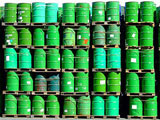Oil: Politics Over Price
By Matthew Hulbert for ISN
Having survived a political bruising in 2009 as prices dropped from a high of $147 a barrel to a low of $33 a barrel, producer states have managed to cling to office through economic improvisation and political centralization of power. With prices now back around the $70-per-barrel mark, they might not be sitting entirely pretty, but they are likely to leave 2009 far stronger than they entered it.
The result is that resource nationalism is likely to rise across the board in producer states to strengthen their political hands once more. This could prove to have major implications for the market, not only for the relationship between producers and consumers but between producers themselves.
Off guard
Oil producers were undoubtedly caught off guard as oil prices plummeted into 2009. Demand was increasingly seen as inelastic; producers set their domestic budgets above $80/b to secure domestic political support, and increasingly doled out money abroad to buy greater influence. But as prices struggled to stay above $30/b once the oil bubble burst, ‘demand destruction’ and desperation on Wall Street spelt serious trouble for producer states. Political survival was the order of the day.
Russia had to draw on its stabilization fund to prop up the banking sector and ruble, while leaving sufficient money aside to pay off oligarchs.
Venezuela had to quickly revise fiscal positions, issue new bonds and loosen monetary policy to try and salvage a disastrous economic position. Venezuelan President Hugo Chavez also forced through a longstanding proposal for a constitutional amendment to extend his presidential tenure indefinitely beyond 2012.
Meanwhile, Iran used political repression to reassert executive control after a dubious ballot failed to return President Mahmoud Ahmadinejad to office with its economy in tatters.
Even the Gulf States had to spend heavily on counter-fiscal measures alongside strong security apparatus to undergird monarchical rule. Being dragged into the political fray was not a prospect many relished.
The result is that the political complexion of producer states in July 2009 looks pretty much the same as it did in July 2008, despite historically wide price spreads. Producer states will almost certainly look to turn this hard-fought political survival into renewed political capital. The most obvious way of doing this is not by constructing an edifice of upstream market liberalization to meet international demand, but rather through sharpened resource nationalism, political capping of reserves and a greater focus on national oil company investment to refill state coffers.
Many producer states have already bitten into the contract renegotiation apple to capture more of the revenue stream. Russia, Algeria, Nigeria, Libya, Kazakhstan, Iran, Ecuador and Venezuela are the most telling examples. The latter three now expect to see a collective fall of 1 million b/d in production to 2014, external pageaccording to the International Energy Agencycall_made (IEA), while Russia expects to see its first year-on-year drop in production since 1998.
On the flip side, production in Saudi Arabia, Angola, Kuwait and the UAE is likely to remain strong to help offset declines elsewhere, but it is by no means meteoric given that political priorities still dictate closely controlling reserves today in order to make more money tomorrow.
International oil companies are unlikely to increase access to reserves beyond the 10-15 percent they can currently vie for as part of this equation. Any excess liquidity will also go on domestic social spending in producer states rather than ploughing petrodollars back into upstream investment; for those who needed reminding, oil demand has just hit its lowest level since 1981.
Friction ahead
The upshot is that consumers could face another price crunch in the coming years as supply-side investment lags and demand rises. Beyond the current speculative froth, the longer term fundamentals are what many traders are watching closely.
They know the Saudi’s are unlikely to invest much more until demand rebounds and that the price hawks within OPEC ranks will all be desperate to see prices increase at others’ expense. Nigeria will continue to try and crush rather than negotiate with insurgents in the Niger Delta to try and regain its lost crown as the biggest producer in West Africa. Venezuela needs high prices to maintain its ‘revolution,’ Iran to paper over its ‘new found’ political cracks (both in terms of domestic cohesion and ongoing investment in its nuclear program) while the fiscal health and political fortunes of all other producer states remains heavily intertwined with a high benchmark price.
Add into the mix that Asian national oil champions will get a firmer foot in the door by putting politics ahead of price and indeed risk to secure oil concessions, then the outlook for international markets look bleak.
But if prices increase in the next few years, political pressures will similarly grow for producer states.
Inflationary pressures are the most obvious concern, but with production levels between price hawks and price moderates set to widen within OPEC and between non-OPEC ranks, the potential for geopolitical friction between the Gulf States and the newly dubbed axis of diesel (Venezuela, Iran and Russia) will sharpen.
If price moderates are wise, they will not only act to cool the market to prevent another bubble from bursting (while gaining political plaudits from consumer states along the way), but continue to invest in economic diversification at home. In such a scenario, the real divide would not be between producer and consumer states, but among producers that have used oil windfalls wisely and those who have flittered receipts away. Unfortunately, this remains a distant prospect; the IEA can rest easy, it won’t need to redraft its position anytime soon…

